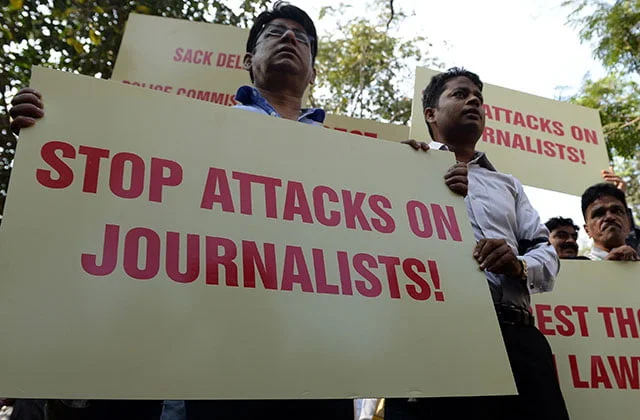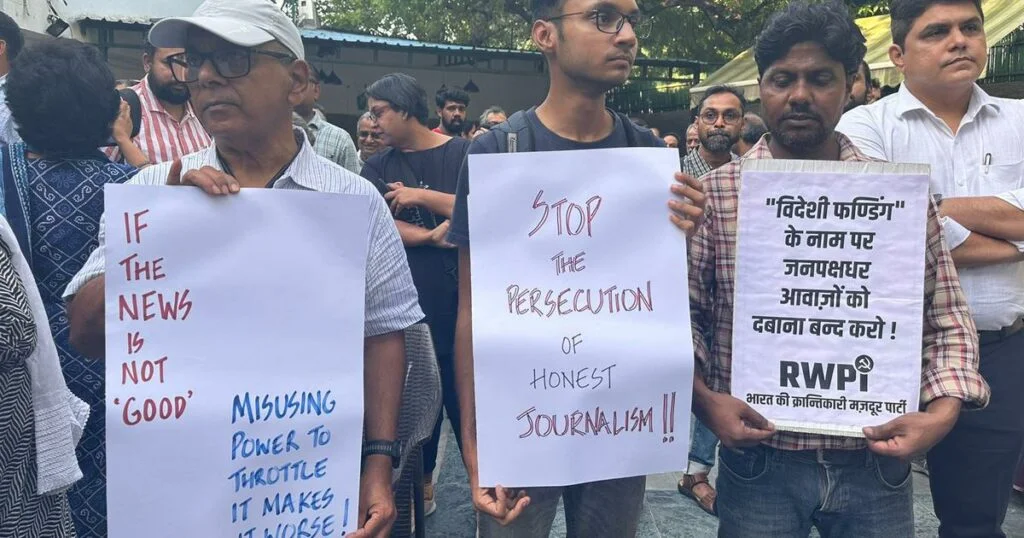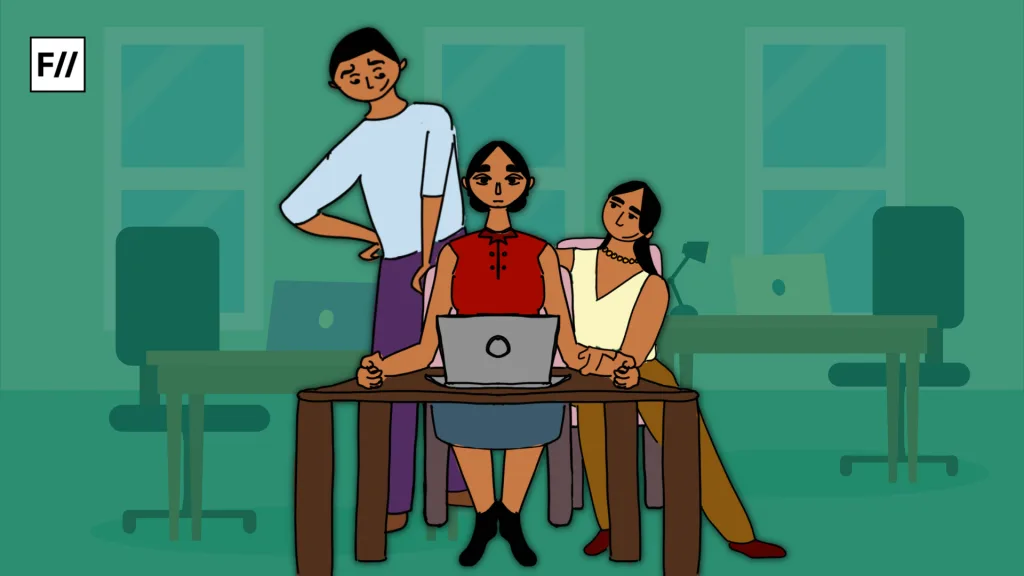In 2022 a total of 57 journalists gave up their lives around the world, for their commitment to report. A year later nearly 800 journalists had been jailed in total and the beginning of 2024 saw 550 of them still languishing in jail. Almost half of that number were incarcerated in China, Myanmar, Belarus, and Vietnam. A new record was also set in the number of women journalists jailed. Since October 7, the Israeli army’s action has killed more than 130 journalists in Palestine, with at least 32 murdered while working. Where does India stand in the post-truth battleground? How unsafe is it to practice journalism in the country?
Silenced in the line of duty
In May a CPJ report noted two cases from Uttar Pradesh – the murder of Ashutosh Srivastava and the assault of Raghav Trivedi. Srivastava was a BJP member and right-wing correspondent who had reportedly received threats a month earlier after covering illegal cow slaughter. Whether his death was by political actors was unclear. Raghav Trivedi, a reporter for the digital outlet Molitics, was assaulted at a BJP rally after he was asked to delete footage of him questioning BJP leaders about allegations that women were paid to attend the rally. Trivedi was called anti-Muslim slurs and left locked in a room unconscious with no evident intervention from the police.
Trivedi was called anti-Muslim slurs and left locked in a room unconscious with no evident intervention from the police.
In June another news made headlines – a 48-year-old journalist from Muzaffarpur, Bihar – Shivshankar Jha was fatally stabbed. Jha had reportedly been receiving threats from the local liquor mafia and had informed the police. The family and local media claimed that the attack was orchestrated by the same organised crime outfit involved in the illicit alcohol trade. A month later journalist Gaurav Kushwaha was found hanging from a tree near his residence in the same district. Preliminary investigation showed he was murdered while Kushawa’s family claimed that people in his village had been threatening him. In September broadcast journalist Salaman Ali Khan was fatally shot in Rajgarh, Madhya Pradesh.

Early this year India saw a breathtaking race for the Lok Sabha crown, and one of its desired crown jewels West Bengal became a stage for political mudslinging. In February Sandeshkhali became a major scandal, positioned to tip the scale against the incumbent officials. Journalists reporting from Sandeshkhali faced major pushback in the form of assault, equipment damage, and arrest.
While Republic Bangla’s Santu Pan was arrested, while Ayan Ghoshal (Zee 24 Ghanta), Sandeep Sarkar, and Sanjoy Chattopadhyaya (ABP Ananda) were victims of assault by political actors. In October 2023, NewsClick’s office was raided by Delhi Special Police and its founder Prabir Purakaystha was arrested under the draconian law UAPA, which allows 180 days of detention without trial or charge. What was the allegation? They were receiving foreign funds for alleged pro-China content. In February the same year Indian authorities raided the BBC offices after the release of a documentary critical of Modi’s role in the 2002 Gujarat riots, followed by a ban on the documentary in India.
Law as a weapon against journalism and journalists
One can argue that journalists often lock horns with powerful actors of a corrupt system, hence it is not surprising that journalists have historically faced life-threatening situations to report. If that is indeed the expected adversity, should there not be legislative measures to protect the fourth pillar of democracy? India lacks any specific central legislation to protect journalists. Article 19(1)(a) of the Indian Constitution guarantees every citizen the right to freedom of speech and expression, which extends to the freedom of the press.
Article 19(1)(a) of the Indian Constitution guarantees every citizen the right to freedom of speech and expression, which extends to the freedom of the press.
The Press Council of India (PCI) derives the authority to regulate the press from this provision. Upon questioning legislative framework for protection of journalists, in 2023, then Minister for Information and Broadcasting of India, Anurag Thakur had refuted questions from the opposition saying, ‘Every person has freedom of expression here…we have freedom of press and it will remain so in the future also.’
Since 2014, at least 15 journalists have faced charges nder the stringent anti-terrorism law, the Unlawful Activities (Prevention) Act (UAPA), with 36 journalists imprisoned during the current BJP government’s rule.

Out of 180 nations India currently ranks 159th in the 2024 world Press Freedom Index, a decade’s fall from its 140th rank in 2014. Nearly half of the 28 journalists killed in India since 2014 were covering environmental issues, including illegal land seizures and mining. Reporters working on sand mafia for example face violent retaliation as they are closely links to politicians and organised crime networks.
Notable journalist murders include Jagendra Singh (2015), Karun Misra (2016), Sandeep Sharma (2018), Shubham Mani Tripathi (2020), and Shashikant Warishe (2023), all targeted for investigating environmental crimes. Across the world around 320 journalists were behind bars at the start of 2024 and seven of these media persons were jailed in India. Aasif Sultan of Kashmir Narrator, jailed since August 2018, Sajad Gul of The Kashmir Walla, jailed since January 2022, independent journalist Rupesh Kumar Singh, jailed since July 2022, independent journalist Gautam Navlakha, under detention since April 2020.
Arrested after publishing an article marking the death anniversary of Burhan Wani, Aasif Sultan spent four years in jail before he was granted bail. However, police immediately re-arrested him under the Jammu and Kashmir Public Safety Act (PSA), a law allowing up to two years of preventive detention. After completing nearly five years in prison he was finally released in February 28 this year. Two days later, in May 1, Sultan was re-arrested under UAPA, allegedly connected to a 2019 prison riot while he was in detention.
Remembering Lankesh
A few months ago Indian journalists remembered her on her seventh death anniversary. Gauri Lankesh, the edtor of independent vernacular magazine Lankesh Patrike, was a staunch critic of right-wing Hindutva politics, communalism and casteism. On September 5, 2017, Lankesh was murdered outside her residence. The SIT probe allegedly recorded prime suspect Waghmere confess to the murder saying, ‘I was told in May 2017 I had to kill someone to save my religion…‘
Gauri Lankesh, the edtor of independent vernacular magazine Lankesh Patrike, was a staunch critic of right-wing Hindutva politics, communalism and casteism. On September 5, 2017, Lankesh was murdered outside her residence.
While Lankesh’s journalism criticising the government killed her, two decades ago Altaf Ahmed Faktoo was murdered for cosying up to the government. Faktoo who had aired pro-government news reports that criticised the separatist movement was was assassinated, reportedly by militant separatists in 1996.

Recently Al Jazeera reported that the UN Educational, Scientific and Cultural Organization (UNESCO) said in a report released on Saturday that on average one journalist was killed every four days. A few years ago, following the killing of Saudi dissident journalist Jamal Khashoggi in 2018, UNESCO said that between 2006 and 2017, over 1,000 journalists were killed; an average of one death every four days.
Despite the numbers and reiterative eye-catching rhetoric, little seems to be changing on the front of safety for journalists. To increase journalist safety, stronger legal protections against threats and violence, along with swift, transparent investigations into attacks, are essential. Additionally, public support for press freedom can help deter intimidation and safeguard journalists’ rights.
Experts had predicted before the election that a second time win for the Modi-government would mean further curtailing of pluralist journalism. While the big names and high profile cases get reported, independent and small town journalists continue to report in perilous conditions with less than optimal compensation. Without them the goggles of propaganda would sit tighter on our nose, yet we fail to protect them. The least we can do is resist the social media noise, seek out authentic news, and raise our voices to defend the freedom to report.
About the author(s)
She/they is an editor and illustrator from the suburbs of Bengal. A student of literature and cinema, Sohini primarily looks at the world through the political lens of gender. They uprooted herself from their hometown to work for a livelihood, but has always returned to her roots for their most honest and intimate expressions. She finds it difficult to locate themself in the heteronormative matrix and self-admittedly continues to hang in limbo




